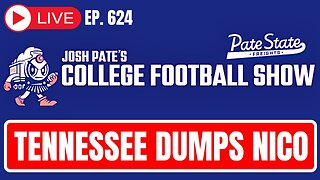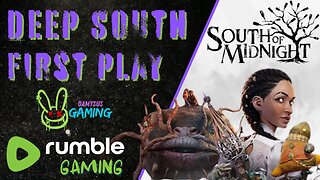Premium Only Content

244 In the Carquinez Woods 1 of 5 BRET HARTE
https://t.me/BretHarteFictions
BRET HARTE by Alan Lewis Silva
American author, Bret Harte (born Francis Brett Hart) was born in Albany, New York, on August 25, 1836. His father, a professor of Greek at Albany College, died during his boyhood. Harte was mostly of British, particularly English ancestry, with the meaningful exception of his Jewish paternal grandfather. After a common-school education, Harte at seventeen relocated with his mother to California in the mid-1850s. Afterwards Harte worked as a teacher, miner, printer, express-messenger, secretary of the San Francisco Mint, and editor. He married Anna Griswold in 1862, and they started their family in California in the San Francisco Bay area of California and having four children together in the course of life.
Bret Harte’s first published literary endeavor was poetry, particularly sentimental and pro-Union Civil War era poetry. Some of Harte’s spiritual ideas were influenced by his friendship with Thomas Starr King, a pro-Union Unitarian minister, his friendship with Samuel Clemens, and his great fondness for the novels of Charles Dickens and British literature, which he shared with his parents.
Harte’s first major literary venture was a series of Condensed Novels (parodies of popular fiction by well-known authors), which he, while also serving as editor, published in The Californian, a weekly periodical). Harte subsequently reissued these writings in book form in 1867. Writing fiction for The Overland Monthly, the earliest considerable Anglo-American literary magazine on the Pacific Coast, established in 1868 with Harte as chief editor, is how Bret Harte became known to large audiences interesting in exotic stories of far-flung California. His sketches and poems appeared in The Overland Monthly’s pages during the next few years and attracted attention in the eastern American states and in Europe.
Bret Harte was an early master of the short story, and his Californian tales were regarded as introducing a new genre into fiction. “The Luck of Roaring Camp” (1868), “The Outcasts of Poker Flat” (1869), the later sketch “How Santa Claus came to Simpson’s Bar,” hundreds of stories, multiple novels and novellas, major novel Gabriel Conroy (1875), and collected poetry such as the narrative verses entitled “Plain Language from Truthful James,” combined to great effect his literary voice and uniqueness.
With humor, pathos, sympathetic treatments of the outsider, elegance in language and description, and power of character portrayals, Harte parlayed familiar motivations and archetypal scenes in a manner that combined and transformed these inputs to an entertaining and imaginative realm, regaled of mining-gulches, gamblers, settlers, pioneers, displaced and unassimilated, oddballs, Old West society, and the predominately picturesque, varied landscape of California.
In popularizing the American short story as a professional fiction writer, in Bret Harte we find a rare delineator of California and storytelling lore to the remote and varied audiences of the globe. Harte, a sort of California Author, preceded also in kind the equivalent of many conventional elements of cinema and audio-visual broadcasting subject to the claims of identity ongoing. Bret Harte’s forty-four original books were published between 1867 and 1898, with numerous uncollected stories and poems located in periodicals from 1861 to 1902. After a year as professor in the University of California, Bret Harte lived in New York, 1871–1878; was United States consul at Crefeld, Germany, 1878–1880; U.S. consul at Glasgow, 1880–1885; and after 1885 resided in London. He died in Camberley, England, on May 5, 1902.
* * *
Thank you for attending this humanities outreach of SDBIBLESTUDY CHURCH.
Humanities is the creative art of intelligence.
Peace and best regards,
Alan Lewis Silva
Minister
SDBIBLESTUDY CHURCH
https://sdbiblestudy.org
https://t.me/sdbiblestudy
-
 33:46
33:46
Sdbiblestudy Church
22 days ago2 COUNSELS OF THE FAITH The Dadestan-i Denig of Zoroastrianism
611 -
 1:14:47
1:14:47
Josh Pate's College Football Show
6 hours ago $3.95 earnedTennessee & Nico Disaster | Portal Chaos Ahead | Biggest “What-Ifs” | Truth About Big Noon Kickoff
36.8K3 -
 2:14:43
2:14:43
Tundra Tactical
5 hours ago $5.72 earned$3200 ZEV HEARTBREAKER Contest!!! TONIGHT On The Worlds Okayest Gun Live Stream
33.2K -
 LIVE
LIVE
IcyFPS
3 hours ago🟢SOLO LEVELING LIVE 🟢 PREMIUM PAYDAY | SUNDAY GUNDAY |
105 watching -

Damysus Gaming
3 hours agoWeaving into the Deep South: South of Midnight First Play!
19.4K3 -
 5:24:51
5:24:51
EricJohnPizzaArtist
5 hours agoAwesome Sauce PIZZA ART LIVE Ep. #43: Misses Ma’am!
32.8K5 -
 54:59
54:59
Stephen Gardner
10 hours ago🔥Biden insider: Obama was Pulling Strings | Trump Derangement is RAGING!
75.9K260 -
 5:51:22
5:51:22
Delnorin Games
6 hours ago🔴 Live - Star Citizen
39K -
 1:07:23
1:07:23
Vedic compatability astrology
4 hours agoDiscover Wisdom from Dr. Andrew Dutta!
20.2K -
 4:52:51
4:52:51
LFA TV
1 day agoLFA TV SHORT CLIPS OF THE WEEK!
72.7K8